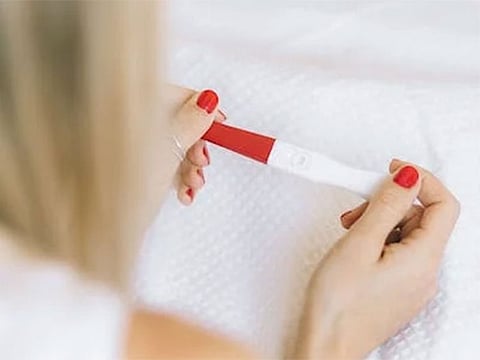Five things to do when you find out you’re pregnant in the UAE
UAE: 5 things to do when you find out you’re pregnant

Dubai: The result on the home pregnancy test shows positive – now what? Your husband and you are excited about the news, but not sure what the next steps are. Don't worry, we've got you covered.
Here's a checklist of five things you need to do when you find out you’re pregnant in the UAE.
Step 1: Get a blood test to know your due date
Once your home pregnancy test is positive, find a hospital or clinic where you can get a blood test. The results usually take a few hours.
While blood tests detect the hCG (human chorionic gonadotropin) hormone like urine tests do, blood tests can confirm the exact amount of hCG in your body, giving your doctor enough information to calculate how far you are into your pregnancy and your due date.
Step 2: Find a private hospital package or apply for a UAE health card
If you have a trusted gynaecologist who also delivers babies, then talk to them about opening a maternity file at their hospital or clinic. It's always helpful to check with the hospital administration to see if they accept your health insurance for maternity.
Also find out the cost charged by the hospital for the antenatal, maternity, and postnatal care. Many hospitals have maternity packages that can give you access to several treatments, tests, and benefits.
If you don't already have a trusted OB/Gyn (obstetrician and gynaecologist), a good way to research is through reviews from friends and acquaintances living in the UAE. You can also join maternity-related groups on Facebook and other social media platforms, which have communities of mums who are always willing to share their advice and experience.
You can also apply for the government Emirates Health Services (EHS) card in the UAE, if you are in the early stages of pregnancy. The Emirates Health Services (EHS), which operates public hospitals and medical centres in various Emirates – predominantly in Sharjah and the other Northern Emirates – allows UAE residents to access health facilities at a reduced cost through its health card. For expatriates of all age groups, you can apply for the card for a service fee of Dh500. The card is valid for one year and needs to be renewed if you wish to continue using the services. With the EHS card, you can access an assigned government medical center during the course of your pregnancy, for regular checkups and other medical assistance.
Step 3: Documents
Make sure all your documents are in order, to open a maternity file and further medical procedures. You will need to get your marriage certificate attested and get copies of your and your husband's passport, visa page and Emirates ID. These documents will also be needed when applying for your child's birth certificate.
Step 4: Check for free or paid birthing classes
Many first-time mums, do not give enough importance to prenatal birthing classes. Birthing classes equip you with the scientific knowledge and practical realities of pregnancy and child birth. There are many free and paid options that you can opt for.
Books and videos online will also give you some idea of what toi expect.
Step 5: Maternity and paternity leaves
Employees in the UAE are entitled to parental leave or off days. According to Article 30 of the UAE Labour Law, a working woman is entitled to a maternity leave of 45 days including the time before and after delivery. If the woman has completed one year of continuous employment for the same employer, she is entitled to full pay during maternity leave; otherwise, she is entitled to half pay. Women are also provided with additional breaks during working hours to nurse their children. The numbers of days you can avail for parental leave depends on whether you work in the private or government sector.
Male employees in the UAE’s private sector are also granted a paid "parental leave" for a period of five working days to care for their child, which can be taken within the first six months of the child’s birth.
So, first step, inform your employer and find out more about how many days of leave you are entitled for. This also helps you plan for childcare in advance.
Sign up for the Daily Briefing
Get the latest news and updates straight to your inbox



